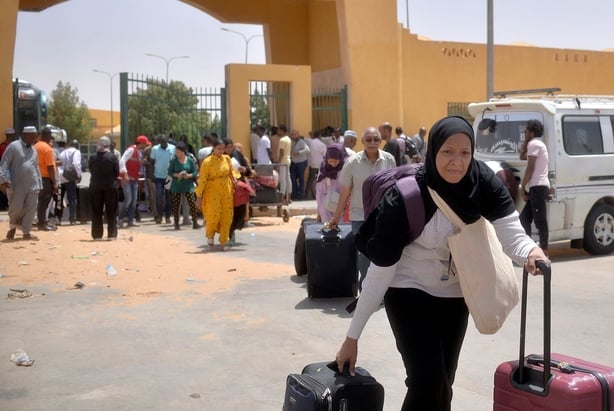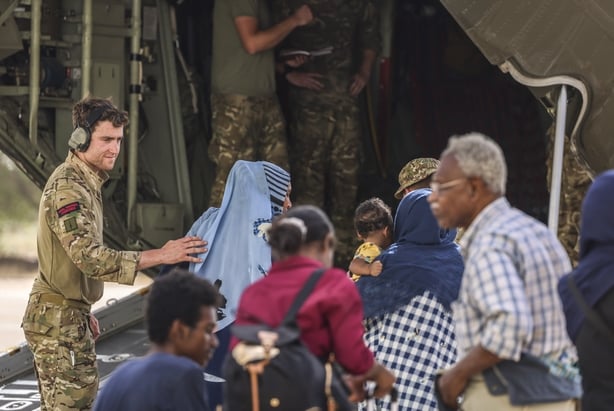Strikes by air, tanks and artillery rocked Sudan's capital Khartoum and the adjacent city of Bahri today, witnesses said, mocking a 72-hour ceasefire extension announced by the army and a rival paramilitary force.
Hundreds have been killed and tens of thousands have fled for their lives in a power struggle between the army and Rapid Support Forces (RSF) that erupted on 15 April and disabled an internationally backed transition toward democratic elections.
The fighting has also reawakened a two-decade-old conflict in the western Darfur region where scores have died this week.
In the Khartoum area, heavy gunfire and detonations rattled residential neighbourhoods. Plumes of smoke rose above Bahri.
"We hear the sounds of planes and explosions. We don't know when this hell will end," said Bahri resident Mahasin al-Awad, 65. "We're in a constant state of fear."
The army has been deploying jets or drones on RSF forces in neighbourhoods across the capital.
Many residents are pinned down by urban warfare with scant food, fuel, water and power.
At least 512 people have been killed and close to 4,200 injured, according to the United Nations, which believes the real toll is much higher. The Sudan Doctors Union said at least 387 civilians had been killed.
The RSF accused the army of violating a United States and Saudi-brokered ceasefire with air strikes on its bases in Omdurman, Khartoum's sister city at the confluence of the Blue and White Nile rivers, and Mount Awliya.
The army blamed the RSF for violations.
The ceasefire is supposed to last until Sunday at 11pm Irish time.
A Turkish evacuation plane came under fire as it was landing at Wadi Seyidna airport in Omdurman today but there were no injuries, Turkey's defence ministry said.
163 Irish citizens, dependants leave Sudan
The violence has sent tens of thousands of refugees over Sudan's borders and threatens to compound instability across a volatile swathe of Africa between the Sahel and the Red Sea.
"From the war planes to the tanks and rockets, we had no other option than to leave," said Sudanese man Motaz Ahmed, who arrived in Egypt's capital Cairo after a five-day trip. "We left behind our homes, our work, our belongings, our vehicles, everything, so we can take our children and parents to safety."
The Department of Foreign Affairs said that 163 Irish citizens and their dependents have been assisted to leave Sudan. Some others have made their way out of the country independently.
"Thank you to our international partners and everyone involved in the evacuation," Tánaiste Micheál Martin posted on Twitter.
"I urge all sides to maintain the ceasefire. Concerned about the widening humanitarian crisis unfolding."
Included in the figure is an Irish Goal aid worker who was evacuated from Sudan with her family last night and taken to Chad.
The aid worker had been in Sudan with Goal since 2009.

In Darfur, at least 96 people had died since Monday in inter-communal violence rekindled by the army-RSF conflict, UN human rights office spokesperson Ravina Shamdasani said.
Releases and escapes from at least eight jails, including five in Khartoum and two in Darfur, were compounding chaos, she added.
In El Geneina, capital of West Darfur, a major hospital supported by medical charity Médecins Sans Frontières (Doctors Without Borders) was looted during a violent intrusion over the past two days, the group said.
"Many people are trapped in the midst of this deadly violence. They fear risking their safety and lives trying to reach the rare health facilities that are still functional and open," said Sylvain Perron, MSF's deputy operations manager for Sudan.
Relief agencies have been largely unable to distribute food to the needy in Africa's third-largest country, where a third of its 46 million people were already reliant on donations.
'Heartbreaking' obstacles facing Irish residents in Sudan
Among Sudan's neighbours, Egypt said it had taken in 16,000 people, while 20,000 had entered Chad and the UN refugee agency said over 14,000 had crossed into South Sudan, which won independence from Khartoum in 2011 after decades of civil war.
Some had walked from Khartoum to South Sudan's border, a distance of over 400km, a spokesperson for the UN refugee agency said.
One of Africa's largest cities, Khartoum had long been untouched by Sudan's string of civil wars.
Despite global appeals for talks, army chief General Abdel Fattah al-Burhan told U.S. based Arabic language broadcaster Al Hurra it was unacceptable to sit down with RSF head Mohamed Hamdan Dagalo whom he called "the leader of the rebellion".
The army controlled all of Sudan, though the RSF kept a limited presence in some parts of Darfur, he said.

Friction had been building for months between the army and RSF, whose joint 2021 coup toppled a civilian coalition government and came two years after a popular uprising ousted veteran Islamist autocrat Omar al-Bashir.
Both the army and RSF were required to cede power to civilian parties under a transition plan meant to be finalised earlier this month but the process foundered over timing issues, including when the RSF would be absorbed into army ranks.
Paul Westbury, Security Adviser for Goal East Africa, said the situation in Sudan is "dire".
Speaking on RTÉ's Morning Ireland, he said the agency has up to 30 staff in Omdurman and they are supporting each other during this volatile situation.
"It is quite dangerous for them but they are trying to help each other as best they can," he added.
Mr Westbury said some have managed to leave where the fighting is happening, but others are trapped because it is difficult to move around with military on the streets and also with the risk of "overhead bombings".
He said Goal is hopeful that it can get more food and water to staff and "ultimately" move them to safer locations.
